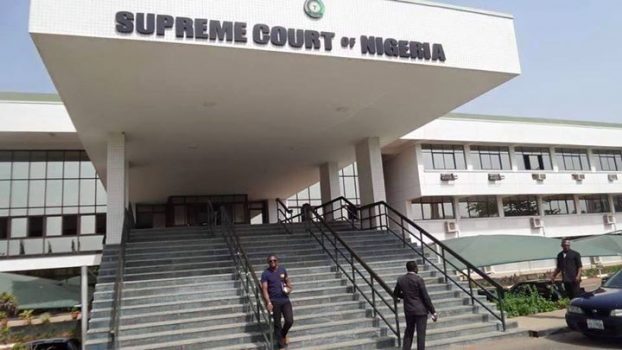 The Supreme Court has upheld the legality of the Economic and Financial Crimes Commission (EFCC) and two other anti-corruption agencies, dismissing a suit brought by 19 states challenging their establishment.
The Supreme Court has upheld the legality of the Economic and Financial Crimes Commission (EFCC) and two other anti-corruption agencies, dismissing a suit brought by 19 states challenging their establishment.
A seven-member panel of justices, led by Justice Uwani Abba-Aji, ruled on Friday that the EFCC Establishment Act of 2002 did not require ratification by state Houses of Assembly as it is not a treaty but a convention. The apex court emphasized that the Act, validly passed by the National Assembly, is binding on all states in Nigeria.
The court clarified, “A convention would have required ratification by member states, but the EFCC Act is domestically enacted legislation. In Nigeria, federating units do not have absolute power to override such laws.”
The decision reinforces the constitutional authority of the National Assembly to legislate on anti-corruption matters.
The 19 states, through their Attorneys General, argued that the EFCC Act violated Section 12 of the 1999 Constitution, which mandates state legislative consent for implementing international conventions domestically. The plaintiffs contended that the EFCC Act stemmed from the United Nations Convention against Corruption, which was not properly domesticated, rendering the agency illegitimate.
Additionally, the plaintiffs argued that the EFCC, the Independent Corrupt Practices and Other Related Offences Commission (ICPC), and the Nigerian Financial Intelligence Unit (NFIU) were unconstitutional since the states had not approved their establishment.
The Federal Government, represented by Attorney-General of the Federation and Minister of Justice Prince Lateef Fagbemi, SAN, argued that the EFCC was established under the provisions of Section 15(5) of the 1999 Constitution, which mandates the state to abolish corruption.
Fagbemi refuted the claim that the EFCC Act was solely derived from an international convention, emphasizing that it was enacted as domestic legislation.
“The EFCC is a product of valid legislation aimed at fighting corruption and financial crimes. Nullifying the agency would threaten the ongoing anti-corruption efforts,” Fagbemi argued.
The court dismissed the states’ claim, reaffirming that the EFCC’s operations are consistent with the Constitution. The ruling stated:
“Any Act competently passed by the National Assembly remains binding on all states. The investigative powers of the EFCC are not in conflict with the legislative powers of state assemblies.”
The court underscored that the EFCC’s establishment aligns with Nigeria’s commitment to combat corruption and financial crimes effectively.
The EFCC was established in December 2002 under the administration of President Olusegun Obasanjo, with its operations commencing in 2003. Its establishment Act was later amended in 2004.

Tinubu Confers Posthumous National Honour On Late Lagbaja
Nigeria’s Inflation Rate Climbs To 33.88% In October 2024
NJC Recommends Retirement, Suspends Judges Over Misconduct
NNPC Signs Gas Supply Deal With Dangote Refinery For Power Generation